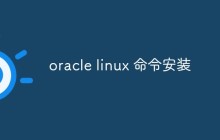-

- oracle linux 命令安装
- Oracle Linux是由Oracle公司发布的一款基于Red Hat Enterprise Linux(RHEL)操作系统的Linux发行版。Oracle Linux具有稳定性高、易于管理和优秀的性能等特点,而且完全兼容RHEL,因此备受企业用户的青睐。本文将介绍Oracle Linux中常用命令的安装方法。1. yum命令yum是Oracle Linux中常用的命令之一,
- Oracle . 数据库 1027 2023-05-18 09:19:07
-

- oracle 设置密码
- Oracle是一种常见的数据库系统,数据安全是非常重要的。下面我们将详细介绍如何在Oracle数据库中设置密码以保护您的数据。1. 登录到数据库首先,登录到Oracle数据库。您可以使用SQL*Plus或SQL Developer等工具,输入用户名和密码,以管理员身份登录到数据库。2. 修改用户密码在Oracle数据库中,您可以使用ALTER USER语句来修改用户密码。语法如
- Oracle . 数据库 799 2023-05-18 09:15:08
-

- oracle不能启动
- Oracle是一种流行的关系型数据库管理系统(RDBMS)。它被广泛应用于企业级应用程序和数据存储。但在使用过程中,用户可能会遇到无法启动Oracle的情况。这篇文章将探讨几种可能导致Oracle启动失败的常见原因以及如何排除这些问题。1. 数据库实例无法启动当用户尝试启动Oracle实例时,Oracle会尝试在服务器上创建进程,以便可以运行实例。但如果系统上有其他进程正在占用
- Oracle . 数据库 1647 2023-05-18 09:12:37
-

- oracle表删除列
- 在Oracle数据库中,删除表中的列是一项常见的任务。如果您不需要某些列或者要求满足特定的数据完整性要求,那么删除列可能是非常必要的。本文将向您介绍如何在Oracle数据库中删除表中的列。在Oracle数据库中,您可以通过ALTER语句删除表中的列。该语句需要指定要删除列所在的表以及要删除的列的名称。下面是删除表中列的基本语法:```ALTER TABLE table_name
- Oracle . 数据库 1570 2023-05-18 09:12:07
-

- oracle 用户名修改
- Oracle是一种常见的关系型数据库管理系统,它可以存储,管理和处理各种类型的数据。在Oracle数据库中,每个用户都有一个唯一的用户名和密码,这些用户名和密码用于登录数据库并访问其内容。如果您需要修改Oracle数据库中的用户帐户名称,则可以按照以下步骤执行。步骤1:使用管理员账户连接到Oracle数据库在开始使用管理员帐户进行Oracle数据库用户名修改之前,您需要使用管理
- Oracle . 数据库 1859 2023-05-18 09:08:37
-

- win7安装oracle客户端安装
- 在进行数据库开发或管理员工作的过程中,我们经常需要使用到Oracle数据库。为了能够对Oracle数据库进行操作,我们需要在Windows 7操作系统上安装Oracle客户端软件。本文将为大家介绍在Windows 7操作系统上如何安装Oracle客户端软件的详细步骤。步骤一:下载Oracle客户端软件在安装Oracle客户端软件之前,我们首先需要下载相应的安装包。在官方网站上,
- Oracle . 数据库 1585 2023-05-18 09:04:37
-

- oracle 表字段修改
- Oracle 是当今最流行的关系型数据库之一,使用 Oracle 数据库时,可以创建表来存储数据。在创建表时,您会定义表所需要的各种字段。但是,在实际应用中, 可能需要修改表的字段,比如增加、删除、修改列等操作,让表的列定义更加合理化、规范化。本文将指导读者修改 Oracle 表的字段,并且涵盖几个常见的修改场景。1. 增加一列我们可以使用 ALTER TABLE 语句来添加新
- Oracle . 数据库 778 2023-05-18 09:00:37
-

- oracle监听设置
- Oracle数据库中的监听是一个重要的组件,它负责监听来自客户端的连接请求,对这些请求进行分配并将其转发到数据库实例中。因此,当我们安装Oracle数据库时,需要为其设置一个监听器。下面将介绍如何在Oracle数据库中设置监听器。第一步:查看当前监听状态在进行监听设置之前,我们需要先查看当前的监听状态。我们可以使用命令行工具lsnrctl来完成此操作。在终端或命令行中输入以下命
- Oracle . 数据库 4372 2023-05-17 22:59:07
-

- oracle 判断是否数字
- Oracle是一种关系型数据库管理系统,它提供了许多强大的数据处理和存储功能。在数据库中,经常需要判断某些数据是否为数字类型。本文将介绍几种Oracle判断是否为数字的方法。1. 使用正则表达式Oracle中可以使用正则表达式来判断某个字符串是否为数字类型。可以使用REGEXP_LIKE函数来实现。语法:```REGEXP_LIKE(string, pattern)```其中,
- Oracle . 数据库 6371 2023-05-17 22:47:08
-

- oracle 删除表及约束
- Oracle是一个功能强大的数据库管理系统,具有广泛的应用性。在使用Oracle进行数据库管理时,我们常常需要删除表及其约束。本文将介绍如何在Oracle中删除表及其约束。一、删除表在Oracle中删除表有两种方式:1.使用DROP TABLE语句删除表DROP TABLE语句可以用于删除一个或多个表,语法如下:```DROP TABLE table_name [CASCADE
- Oracle . 数据库 2227 2023-05-17 22:42:07
-

- oracle11g乱码
- 随着Oracle数据库在企业中的应用越来越广泛,一些用户可能会遇到一些问题,例如Oracle11g中出现的汉字乱码问题。这种问题可能是由于不正确的字符集设置或其他原因引起的。本文将讨论Oracle11g中汉字乱码的原因以及解决方法。一、原因1. 数据库字符集与应用程序字符集不匹配在Oracle数据库中,字符集定义了数据库可以处理的所有字符及其编码方式。如果应用程序使用的字符集与
- Oracle . 数据库 615 2023-05-17 22:23:07
-

- oracle 查询速度
- 随着数据量和数据库结构的不断增加,数据库查询速度已成为一个至关重要的问题。对于Oracle等大型数据库,高效的查询速度已成为用户或企业取得成功的关键因素之一。而在实际应用中,加速Oracle查询速度的方法有很多。本文将介绍一些加速Oracle查询速度的方法和技巧,希望对日常数据处理工作和数据库优化有所帮助。一、建立恰当的索引索引是提高Oracle查询速度的重要手段,它能够加速查
- Oracle . 数据库 1130 2023-05-17 22:19:06
-

- oracle 时间格式查询
- Oracle是一种流行的关系型数据库管理系统,广泛应用于各种企业级应用程序。在Oracle中,日期和时间是非常重要的数据类型,因为许多业务功能的实现都依赖于它们。Oracle支持多种日期和时间格式,本文将介绍如何在Oracle中查询和使用日期和时间格式。一、Oracle日期和时间数据类型Oracle支持4种日期和时间数据类型,分别是DATE、TIMESTAMP、TIMESTAM
- Oracle . 数据库 4090 2023-05-17 22:13:36
-

- oracle怎么建数据库
- Oracle 数据库是一种可以存储和管理数据的系统。在开始建立 Oracle 数据库之前,您需要安装 Oracle 软件和相关产品。一旦完成安装,就可以开始创建数据库。以下是建立 Oracle 数据库的步骤:1. 创建一个适当的路径在计算机上选择一个合适的路径。建议不要将 Oracle 数据库文件放在 C 驱动器中,因为 C 驱动器通常需要保持干净,以确保 Windows 操作
- Oracle . 数据库 2752 2023-05-17 22:04:06
-

- oracle 安装成功
- Oracle 是一种常用的关系型数据库管理系统,在商业领域、大型企业和高校中被广泛使用。它具有强大的数据处理和管理能力,能够处理大型数据和多用户访问。安装 Oracle 需要一定的技术基础,但是只要遵循正确的步骤和注意事项,就能成功安装和配置它。以下是oracle安装成功的步骤:第一步:下载并安装 JDK在安装 Oracle 前,需要先下载并安装 Java Developmen
- Oracle . 数据库 525 2023-05-17 21:57:36

PHP讨论组
组员:3305人话题:1500
PHP一种被广泛应用的开放源代码的多用途脚本语言,和其他技术相比,php本身开源免费; 可以将程序嵌入于HTML中去执行, 执行效率比完全生成htmL标记的CGI要高许多,它运行在服务器端,消耗的系统资源相当少,具有跨平台强、效率高的特性,而且php支持几乎所有流行的数据库以及操作系统,最重要的是




























